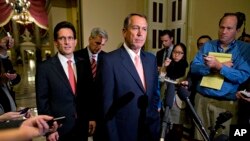CAPITOL HILL —
As a partial U.S. government shutdown nears a second day, the legislative breakdown that produced it shows no signs of repair. Members of Congress pointed fingers at one another Tuesday, and jockeyed to avoid blame for the suspension of federal operations.
Political brinksmanship ruled the day in Congress. With lawmakers bracing for a popular backlash against the halt in government services, Republicans proposed piecemeal funding to reopen some of the nation’s most-popular federal entities. Senator Ted Cruz urged emergency funds for national parks and the agency serving America’s veterans.
“We should reopen the national parks today. We should fund the VA [Veterans Administration] today. The only reason it might not happen is if Harry Reid and Democrats object. I hope they do not," said Cruz.
Senate Majority Leader Harry Reid rejected the Republican idea as “wacky.” Fellow Democratic Senator Richard Durbin called it an outrage.
“Senator Cruz is going to pick and choose those departments of government that he wants to open. To think that this senator has the nerve to try to decide what is really, really important for America," said Durbin.
By the end of the day, the piecemeal funding initiative had faltered. But the episode forced Democrats into the uncomfortable position of opposing a limited reopening of the federal government, and aided Republican efforts to portray themselves as reasonable compromisers - and Democrats as hardline intransigents.
Those efforts began earlier in the day, when the Republican-led House voted to begin negotiations with the Senate on ending the government shutdown. Republican Congressman Tom McClintock said that is how Congress is supposed to work.
“After the House and Senate have exercised their best judgment, they are then supposed to sit down and negotiate out their differences," said McClintock.
Those differences center on President Barack Obama’s health care law, a major portion of which went into effect Tuesday. Republicans have sought to defund or delay the Affordable Care Act, and many House Republicans refuse to vote to fund the government absent provisions eroding the law, also known as Obamacare.
Senate Democrats said they would welcome bicameral conferences, but not during a government shutdown. Majority Leader Harry Reid:
“We [Senate Democrats] are happy to go to conference. But only if the government is reopened," said Reid.
Reid called on the House to pass a funding bill free of political stipulations. House Speaker John Boehner had this response:
“My goodness, they [Democrats] will not even sit down and have a discussion about this," said Boehner.
Democrats accuse Republicans of holding government funding hostage to their political agenda and say they will not reward that behavior.
Initial polling shows the American people more apt to blame Republicans than Democrats or President Obama for the government shutdown. Republicans want to change the perception of culpability. Democrats are banking on it continuing and forcing a resolution of the impasse on their terms.
Political brinksmanship ruled the day in Congress. With lawmakers bracing for a popular backlash against the halt in government services, Republicans proposed piecemeal funding to reopen some of the nation’s most-popular federal entities. Senator Ted Cruz urged emergency funds for national parks and the agency serving America’s veterans.
“We should reopen the national parks today. We should fund the VA [Veterans Administration] today. The only reason it might not happen is if Harry Reid and Democrats object. I hope they do not," said Cruz.
Senate Majority Leader Harry Reid rejected the Republican idea as “wacky.” Fellow Democratic Senator Richard Durbin called it an outrage.
“Senator Cruz is going to pick and choose those departments of government that he wants to open. To think that this senator has the nerve to try to decide what is really, really important for America," said Durbin.
By the end of the day, the piecemeal funding initiative had faltered. But the episode forced Democrats into the uncomfortable position of opposing a limited reopening of the federal government, and aided Republican efforts to portray themselves as reasonable compromisers - and Democrats as hardline intransigents.
Those efforts began earlier in the day, when the Republican-led House voted to begin negotiations with the Senate on ending the government shutdown. Republican Congressman Tom McClintock said that is how Congress is supposed to work.
“After the House and Senate have exercised their best judgment, they are then supposed to sit down and negotiate out their differences," said McClintock.
Those differences center on President Barack Obama’s health care law, a major portion of which went into effect Tuesday. Republicans have sought to defund or delay the Affordable Care Act, and many House Republicans refuse to vote to fund the government absent provisions eroding the law, also known as Obamacare.
Senate Democrats said they would welcome bicameral conferences, but not during a government shutdown. Majority Leader Harry Reid:
“We [Senate Democrats] are happy to go to conference. But only if the government is reopened," said Reid.
Reid called on the House to pass a funding bill free of political stipulations. House Speaker John Boehner had this response:
“My goodness, they [Democrats] will not even sit down and have a discussion about this," said Boehner.
Democrats accuse Republicans of holding government funding hostage to their political agenda and say they will not reward that behavior.
Initial polling shows the American people more apt to blame Republicans than Democrats or President Obama for the government shutdown. Republicans want to change the perception of culpability. Democrats are banking on it continuing and forcing a resolution of the impasse on their terms.




